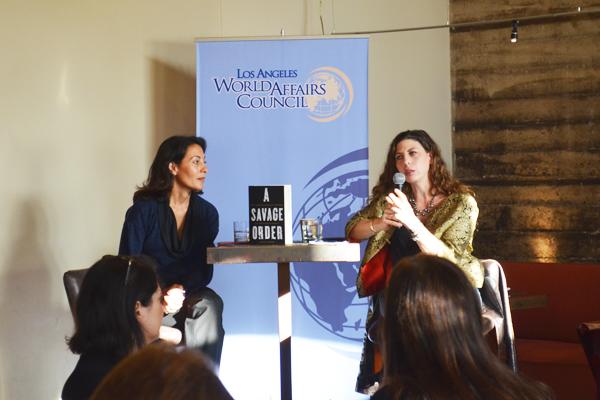 Maryam Zar (left) moderates the discussion with Rachel Kleinfeld.
Maryam Zar (left) moderates the discussion with Rachel Kleinfeld.
“Violence doesn’t stop when you have politicians covering up for the criminals,” said Rachel Kleinfeld, Senior Fellow at the Carnegie Endowment for International Peace, in a moderated discussion with Maryam Zar, LAWAC member and LA City Commissioner on the Status of Women. Violent democracies flourish when the elites who are challenged politicize the police and do business with criminal groups. In turn, the poor turn to these criminal groups for protection from the police, and the middle class hires their own private security. In the end, you have corrupt and violent democracies like Brazil, Honduras and the American South after the Civil War.
One of the key ingredients for peace is to mobilize the middle class, who often assume the poor are just as guilty as the criminals persecuting them. The phrase “it’s just criminals killing criminals” is common, but, Kleinfeld says, couldn’t be further from the truth and lacks understanding of the basic differences in life that the poor experience compared with the middle class. The poor face violence and extortion from the criminal groups that protect them and persecution from the politicized police forces. The middle class needs to be made aware of these differences, which is where journalism and social organizers come in. Truth must be told in publications or outlets that the middle class reads. The bulk of the work is usually done by social organizers who have the connections to bring about change. “It takes pragmatism on both sides.”
Kleinfeld listed off a variety of ways that the US and individuals can help and most of them have to do with cutting off funding for the criminals. She said the US needs to stop pouring money into violent governments, particularly their security services, and stop giving them weapons. Instead, the US should be putting money into governments that have overcome this violence. There also needs to be more transparency with how aid is spent and money laundering laws throughout the world need to be changed. On an individual basis, people can do research into hotels and cities before traveling there to make sure that they aren’t owned or controlled by warlords, which is more common than one might think. Tourism dollars are heavily laundered in places like Jamaica and Baja, Mexico, frequent vacation spots for Americans. Individuals can also make sure they receive some liberal arts education, which Kleinfeld says helps people to become more sensitive to humanities issues.
To read more about Kleinfeld's work on violence in democracies you can click here to purchase her new book A Savage Order: How the World's Deadliest Countries Can Forge a Path to Security.
